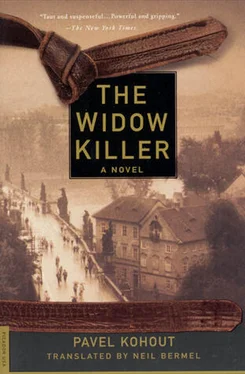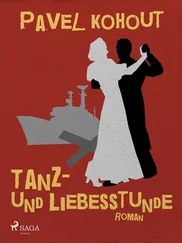Buback at first led his date to clear a path for her. After a while he felt the throng push her sharply against his back, and managed by turning around to get her in front of him. She realized that he was trying to make room for her to breathe, and gratefully turned her head back toward him.
“Thanks. ..”
A better reward was the pleasantly bitter scent of her hair, and he buried his head in it.
The bombs had not yet begun to fall, and they maneuvered fairly quickly into the narrowest part of the flow to the head of the stairs, which led them down to an extensive complex of shelters. The spacious cellars of German House were furnished with relatively comfortable benches, and it turned out — when after the shock of heat there came a gust of cool air — that the climate was pleasant down there as well. Following the militia’s orders, they pressed onward, passing a cellar alcove restricted to VIPs; towering above the others in a gray haze was Meckerle, talking to State Secretary Frank. Buback was suddenly glad that his boss had not noticed them.
He and Marleen Baumann ended up among unfamiliar couples in a cozy corner, where there was only seating for two. There she thanked him again.
“You were both polite and skilled. What a shame we didn’t get to dance; you must be good on the ballroom floor.”
“Don’t be sorry,” he said directly. “I’m sure I would have disappointed you.”
“You don’t dance?” she asked, surprised. “I wouldn’t have thought it of you.”
For the second time in twenty-four hours he repeated the fact that he had suppressed for months in the vain hope that what went unsaid might not be true.
“I lost my family in an air raid last year.”
And then he added quite superfluously: “I don’t feel ready for dancing yet.” He gazed into her gray eyes and saw there the same sympathy that had so surprised him yesterday in the young Czech.
“Please accept my condolences, Herr Buback. You have no idea how well I understand. My parents and brothers perished in the first raid on Hamburg. A stroke of bad luck that both my brothers were on leave at the same time. I lost my husband last year in the retreat from East Prussia. But as opposed to you, I’ve lost the strength to mourn. It’s not just that as a woman, I can’t allow myself to; to be honest, I didn’t really feel like it. With him, at least…”
She gestured with her head in the direction where her expansive lover was taking cover with his wife and the cream of party and government society. Then she fell silent, rooting energetically through her handbag until she found a gold ladies’ cigarette case and a matching lighter. She offered him the box.
“It’s not allowed down here,” he said, drawing her attention to a notice on the wall.
“But they“—once again that sharp motion toward the leaders’ sanctuary—“they were smoking.”
“Quod licit Iovi… Fine for the brasses, but not for the masses,” he translated freely.
She swore softly like a man, threw the items back in her bag, and glanced around the cellar. This was his first opportunity to really look at her. What he saw surprised him. Why would a beast so powerful that even his equals trembled before him choose precisely this one — out of all the young German women running around Prague? And was she young? In the darkened entranceway of her building, in the half-lit car, even in the ballroom where she sat next to him, her slenderness helped her pass as a young girl. The bright light of the shelter, however, mercilessly revealed the truth. Thirty? Thirty-five? Even more? The energy of her every movement spoke against it.
In any case, she was the exact opposite of the Germanic ideal of womanhood as portrayed by the Freie Körperkultur. But she was equally unlike his Hilde and the Prague girl he had invited tomorrow… where indeed? And what would he say to the girl once they had covered her father’s case? Would he invite her home? How would she react? And how should he behave? If she agrees? If she refuses?
As he pondered these questions, he must have been staring intently at Marleen Baumann, who brought him back to the present with an unexpected question,
“You take me for a better sort of whore, don’t you? If not for a worse sort?”
Put on the spot, he stammered a confused protest. Surprisingly it satisfied her.
“I’m glad to hear it. You see, I’d been alone for so long. I find most German men repulsive. At least he“—again she nodded her chin in that direction, and Buback sensed that she was avoiding his name and title—“isn’t a gutless ass-kisser.”
She gave a gruff laugh, which matched her dainty appearance as poorly as her vocabulary did. In fact, her whole face, as he could now see up close, was a collection of disturbing details. Her dovecolored eyes sat strikingly far from one another; eyebrows rising from the bridge of a large nose drooped to the outer edges of her face in an arc reminiscent of clown’s makeup. She had a long chin, a forehead that was too high, and very narrow lips set quite deep beneath her nose, which further increased the sharpness of her profile when she stopped speaking. Suddenly he noticed an oblique line falling from her left earlobe almost across her whole throat; how did he miss it earlier? Oh, of course! She had probably covered it with powder. This wrinkle or scar of a hard-to-distinguish shade between light green and pale yellow indicated a secret.
As if reading his last unspoken thought, she said: “Anyone who hasn’t seen me in a year doesn’t recognize me, Herr Buback. In the course of a few days I lost my reason for living and came to know every kind of depravity on earth. When I realized that I could not kill myself — because more than anything I fear my own death — I learned to survive. I can lie so perfectly that even you would believe me if I wanted you to.”
“Why don’t you want me to?” he asked her, purely to keep the conversation going; he was completely captivated by his new discovery. Yes, her whole face was disturbingly mysterious; as soon as she spoke she changed beyond belief. Her lips became her dominant feature, suddenly so full that they surrounded him, and all her apparent defects coalesced at once into an image far from “beautiful” in the ordinary sense but nonetheless provocatively attractive.
Erwin Buback now knew why his boss kept her. That face was omnipresent; you could not overlook it nor, apparently, forget it.
“Why don’t I want you to?” she repeated, and laughed again. “Apparently I trust you.”
“What did I do to deserve that?”
“As long as fate lets them exist, men only half as interesting as you,” she said to his face without a speck of coquetry, “can live in the present moment, here in our twilight of the gods, day by day, night by night. But you’ve stayed faithful to your old loves. I admire it all the more for being incapable of it myself.”
He remembered the young Czech woman again, but he did not have the strength or at the moment any reason to correct her. Instead, he gladly acceded to her next request, and began to talk about his wife and daughter. She listened to him attentively, her palms planted firmly on the bench, and he soon noticed the burden of his grief lightening and dispersing slowly into his own words, melding painful facts into comforting memories.
The Allied squadrons crisscrossing the Protectorate held them in the cellar until almost midnight. When the all clear sounded, a thoroughly bored Meckerle had to go off to bed with his wife, who had developed a headache in the cellar air. He managed to pay his respects to his mistress and convey to Buback that his personal chauffeur would return for them. Although the party was starting to gain steam again, both of them understood what the message meant. When later he kissed her hand at the car door and she realized that he was not coming with her, she used the curtain of sound from the motors and voices to ask a further unexpected question.
Читать дальше












